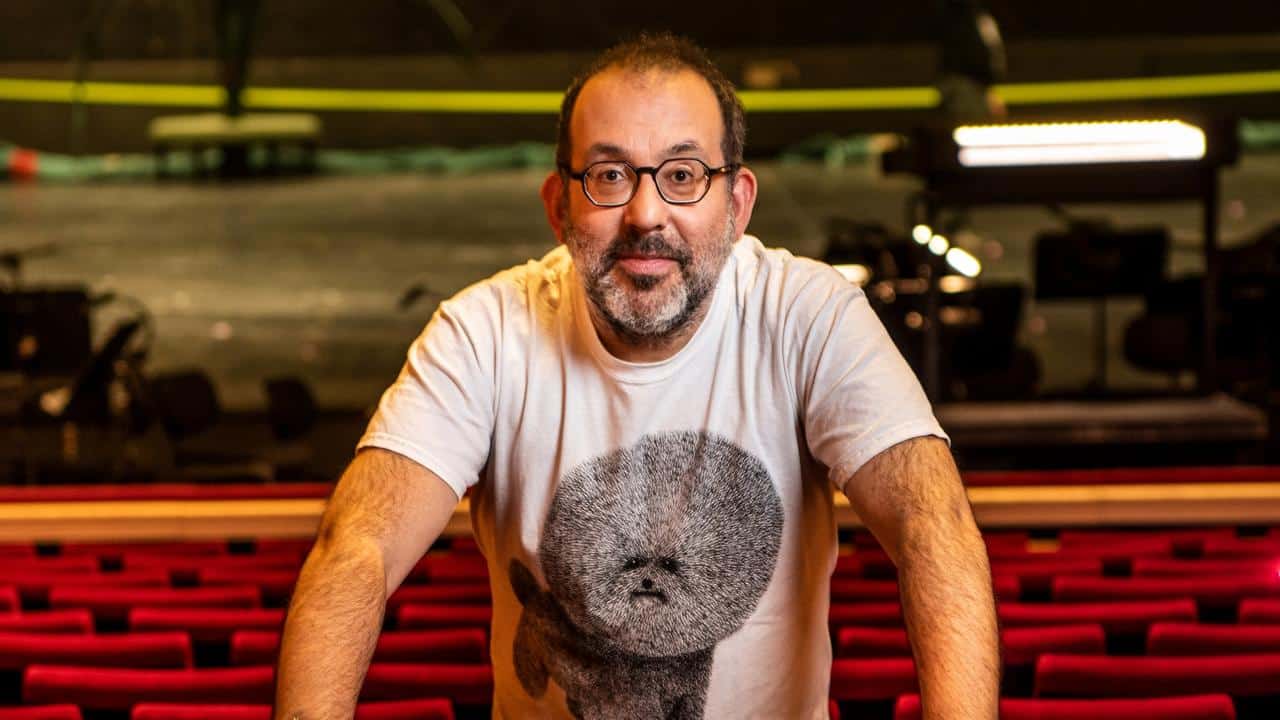Table of Contents
A Tumultuous Debut
Problematic yet enduring, The Threepenny Opera caused controversy from the moment it premiered at the Theater in 1928. As director Barrie Kosky explains, “It’s one of the most famous disasters of all time,” recalling how half the set collapsed a mere thirty minutes before showtime. Audiences felt perplexed, and few had faith in this new work. Many believed it would go down in history as a complete failure. Yet despite those initial setbacks, the production managed to make its mark, becoming a classic in the annals of musical theater.
Barrie Kosky, widely considered the most gifted opera director of his generation, has undertaken the challenge of bringing his 2021 Berliner Ensemble staging of The Threepenny Opera to Brooklyn Academy of Music (BAM). This limited engagement, co-presented by St. Ann’s Warehouse, runs for four nights—from April 3 to April 6—and serves as Kosky’s New York City debut. Critics have already lauded his version, which puts the notorious outlaw Mackie Messer front and center. The cast invites viewers to immerse themselves in a dodgy but irresistible world that stretches all the way back to 1920s Berlin.

Much of the production revolves around Mackie Messer, a cunning thief and brutal cutthroat immortalized by the iconic tune “Mack the Knife.” Bobby Darin and Frank Sinatra famously recorded the number in the ’50s, but it originated in this very show. In Kosky’s hands, Mackie’s rogues’ gallery of crimes draws the audience in with both repulsion and fascination. This darker tone remains a key characteristic of The Threepenny Opera, which dares to shine a harsh spotlight on the moral decay simmering under polite society.
Origins in Beggar’s Opera
Although ‘The Threepenny Opera’ by Bertolt Brecht and Kurt Weill is based on John Gay’s 18th century satire, The Beggar’s Opera. When the success of Gay’s dramatization in the fashionable London theatre was at its highest peak in the 20s, Brecht’s partner and translator, Elisabeth Hauptmann, had the idea of making an adaptation for the German audience. However, the final version changed the events where Mackie and new wife Polly Peachum were the main characters, the latter being the daughter of the biggest beggar. The tale quickly escalates when Polly’s father learns that his brand-new son-in-law is a notorious criminal and pleads with police inspector Tiger Brown to issue an arrest warrant. Despite Brown’s old friendship with Mackie, he bends under pressure, forcing the newlywed to flee and leaving Polly to command the gang on her own.
Kosky characterizes the production as cynical and satirical, pointing out that late 1920s Berlin was a hotbed of such sentiments. People had little reason for optimism, and the original text reflects that bleakness in full force. Nevertheless, as Kosky also notes, Brecht’s biting humor and Weill’s evocative score inject the piece with enough warmth to keep it from plunging entirely into nihilism. It’s in this swirl of acerbic wit and gorgeous music that The Threepenny Opera truly stands out, balancing its acid-tongued commentary on class struggle with tunes that have anchored it in the public’s imagination for decades.
A Torn Yet Enduring Legacy
From its rocky debut to the present day, The Threepenny Opera has managed to weather dismal predictions and fierce critical scrutiny, evolving into an undeniable classic. Directed now by Barrie Kosky, the show proves its staying power, offering viewers a scathing yet frequently darkly comical perspective on crime, corruption, and the relentless drive for survival. Despite the tale’s cynical stance, it remains thoroughly entertaining, buoyed by an unforgettable score and sardonic energy.
Corruption, greed, and narcissism never seem to fade away, which is one reason The Threepenny Opera continues to resonate from one era to the next. Director Barrie Kosky notes that the story’s parade of scoundrels and lawbreakers still strikes a chord, largely because “the triumph of terrible people is timeless.” At the most dramatic part of the performance, that rascal Mackie Messer, who has a terrible reputation, narrowly escapes execution moment when the noose is already being put around his neck with the arrival of a completely unexpected royal pardon. Instead of being punished as he should, he escapes. This is a clear demonstration of how power and privilege may escape punishment.
When Kosky approached the production, he wanted to steer clear of overt connections to Weimar-era Germany and to avoid anything reminiscent of the musical Cabaret. He believed the original text demanded its own sense of place and mood, separate from the stereotypes of 1920s Berlin. At the time Bertolt Brecht and Kurt Weill created the piece, Brecht was an emerging playwright who had mostly addressed niche audiences. Inspired by social unrest and fascinated by inequality, he gravitated toward reforming John Gay’s Beggar’s Opera into a story steeped in social justice themes. Meanwhile, Weill—raised in a religious family and deeply influenced by Johann Sebastian Bach—leaned toward music that captured raw emotions and exposed inner turmoil.
Social Justice Meets Emotional Desolation
Brecht’s left-wing ideals played out on the stage through razor-sharp satire and a clear undercurrent of social commentary. He channeled a sense of injustice into characters who cheat and hustle, forever testing society’s tolerance for vice. Weill added his own flair to this mix by drawing on both classical music traditions and his upbringing as a Cantor’s son, enveloping the lyrics in a dark yet melodic framework. The upshot is a shocking integration of sarcastic words and touching tunes, resulting in a juggling act that Kosky describes as “a tango” marking the interaction between Brecht’s biting intellect and Weill’s eerie soundscapes.
Neither Brecht nor Weill had encountered a piece quite like The Threepenny Opera before, so they chose to experiment in ways seldom seen onstage. Their creativity manifested in deliberately mismatched elements—somber text clashing with unexpectedly lovely chords, anger paired with tuneful refrains, and stinging sarcasm woven into moody ballads. Kosky sees the production’s greatest obstacle as finding a way to unite these contrasting elements without losing the soul of either. He describes this challenge as binding “intellectual satirical sarcasm” with “melancholic yearning,” achieving that delicate balance where icy commentary overlaps with heat from the orchestra pit.

Central to Weill’s approach was his openness to absorbing multiple influences. He translated synagogue chants, folk tunes, and even the hustle and bustle of industrial cities into something fresh and unexpected. According to Kosky, Weill created a sound that was radical in its day, merging Old World devotion to Bach with the newness of jazz, casual street songs, and raw emotional resonance. By doing so, he overcame the safe formulas of contemporary musical theater, inviting audiences into an atmosphere both strangely familiar and boldly uncharted. This willingness to diversify gave The Threepenny Opera the edgy undertones that have made it endure.
Vaudeville Influence
Barrie Kosky’s vision for The Threepenny Opera draws heavily from vaudeville, creating a style where the actors always feel the presence of the audience and can break the invisible fourth wall easily. The director feels the opinion that this kind of performance spirit makes each scene in the play fresh, spontaneous and somewhat naughty. Rather than letting the show sink under layers of seriousness or weighty subtext, Barrie Kosky insists that his cast deliver lines with the nimble wit of a Lubitsch comedy. By instructing them to speak briskly and smartly, he guards against the sort of overwrought interpretation that can dull the text’s satirical bite. In his view, a quick pace paired with direct engagement allows the piece’s humor and cynicism to breathe side by side, creating an atmosphere that balances dark commentary with an air of joyful transgression.
Kurt Weill, the composer, and Bertolt Brecht, the playwright, conceived Mahagonny which is a song cycle written for the Festival of German Music some time before The Threepenny Opera caught the attention of the public. That early partnership hinted at the singular dynamic they would soon refine. According to historical accounts, Brecht approached Weill only a few months afterward with the idea of adapting John Gay’s The Beggar’s Opera into a biting modern satire. Their collective efforts took shape in a villa in the south of France, where Weill’s wife Lotte Lenya, Brecht’s partner Elisabeth Hauptmann, and director Erich Engel all contributed to shaping scenes and music. Brecht, however, was away handling personal matters in Berlin for part of that crucial time, returning a mere eleven days before the opening—a chaotic process that, remarkably, did not prevent the show from striking an immediate chord with European audiences.
A Worldwide Reception
Despite the controversies that had occurred off the stage, The Threepenny Opera made an unexpected hit all over Europe, charming the public with its piercing display of human weaknesses, dirty criminal activities and through a mix of catchy tunes and social commentary. The production’s directness, dynamism, and subversive humor transformed it into a completely new type of musical in the era. Yet when the show crossed the Atlantic to make its Broadway debut in 1933, it failed to replicate its European success and struggled to attract enough interest to sustain a long run. Over two decades later, however, a 1954 revival finally caught fire in North America, igniting widespread appreciation for the show’s deft combination of sardonic wit and melodic invention. This second chance in the United States helped cement its lasting reputation as an avant-garde landmark in musical theater.
Even though Brecht and Weill were productive in making The Threepenny Opera, they were never the best of friends and in the end they parted their ways. Their relationship was characterized by contrasting standpoints on art, society, and politics. Brecht was about a loud, aggressive manner of speaking that was grounded in his political sympathies, but his main interest was to provoke the audience to think about the status quo. Weill, on the other hand, coming from a strict classical background and leaning towards the fusion of jazz and folk, saw music as a way to bring out emotions, be it yearning, tension, or dread. The confrontation between Brecht’s biting satire and Weill’s lyricism became a compendium of musical genres which marked a skeptical vision of greed and injustice enriched with tunes that are worth remembering even today.
At the Theater’s Heart
When Barrie Kosky staged his own version of The Threepenny Opera, he did so in the Theater, the very venue where the work made its 1928 debut. This choice imbued his production with historical resonance, linking present-day performances to the moment when Weill and Brecht first took creative risks that shocked audiences of their era. Working with the Berliner Ensemble, Kosky found himself connecting not only to the building’s storied past but also to physical artifacts from the theater’s founder. He even rehearsed at Bertolt Brecht’s original desk—an heirloom from the post–World War II period when Brecht established the Ensemble.

In a candid admission, Barrie Kosky reveals that he etched his initials into its wood, leaving a modern mark on a piece of history that represents both the reverence and irreverence of artistic innovation. Barrie Kosky is a Melbourne local and had the ability to get familiar with music at such a young age. He was learning the piano well before his fifth birthday and by the age of six, he got himself a cello showing a keen interest in the pair. He was indeed a “theater kid” who was really into the topic as he often told himself and always showed his passion by singing in school choirs, and acting in amateur plays.
It is likely that the most significant role in his artistic progress was played by his grandmother, Hungarian, who took him to opera concerts, as well as by his parents whose idea was to let him take part in a wider range of music events, both classical and contemporary. The wide range of music and drama traditions had a great impact on his artistic development, which, in turn, defined his open-mindedness towards the idea of uniting different genres, styles, and refusing to follow traditional patterns.



